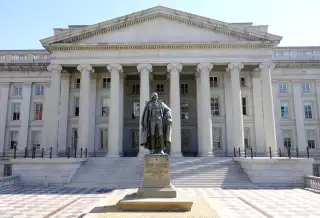Why Bonds Soared After Monday's Stock Market Downturn

While stocks are taking a drubbing on panic selling — the Dow Jones industrial average fell nearly 600 points on Monday after tumbling 530 points on Friday — what's been going on with your bonds?
Panic buying. That's what.
As fearful investors have tried to hide in the relative safety of the fixed income market, they've driven up government bond prices while simultaneously pushing down yields. The yield on 10-year U.S. Treasury securities fell to 1.9% Monday afternoon, the first time the government debt declined below 2% since April. (Bond prices and yields move in opposite directions.)
By the end of the day, yields climbed back up a bit, settling at 2%.
"This is largely a flight to quality," says Wells Fargo Securities senior economist Sam Bullard. "There's heightened concerns over global growth, especially in the emerging markets, and China in particular."
Consider the recent fate of two exchange-traded funds. SPDR S&P ETF Trust , which tracks the S&P 500 index of U.S. stocks, is down 10.3% on a total return basis over the past week. Meanwhile, SPDR Barclays Aggregate Bond ETF is up 0.5%.
This illustrates why older investors with a shorter investing window must allocate sizable portions of their portfolio to bonds, despite low yields. Not only are bonds a source of income, they provide ballast to your portfolio in rocky times like this.
In this environment, you're better off being patient with your fixed income allocation. "A client called me yesterday, and I told her to get a cocktail, sit on the deck and watch the sun go down," says Mary Talbutt, vice president and fixed income portfolio manager at Bryn Mawr Trust, a wealth manager with $7.6 billion in total assets. Despite the recent dramatic drop, that's actually good advice for stockholders, too.
This is not to say that all bonds are faring well.
While government bonds have been in high demand, riskier securities have suffered losses.
This includes high-yielding debt issued be non-investment grade companies. So-called junk bonds are highly correlated with the stock market. And since this stock sell-off was sparked by concerns over China and other emerging market nations, debt issued by developing economies has also suffered.
Meanwhile, the monetary policy tectonic plates may be shifting. For months now the Federal Reserve has hinted at a slight rise in the federal funds rate, which has rested at basically zero since September 2008.
But whether rates will actually be hiked in September is now up for debate, given the newfound global economic fears.
Read next: 3 Charts That Explain the Stock Market’s Huge Drop